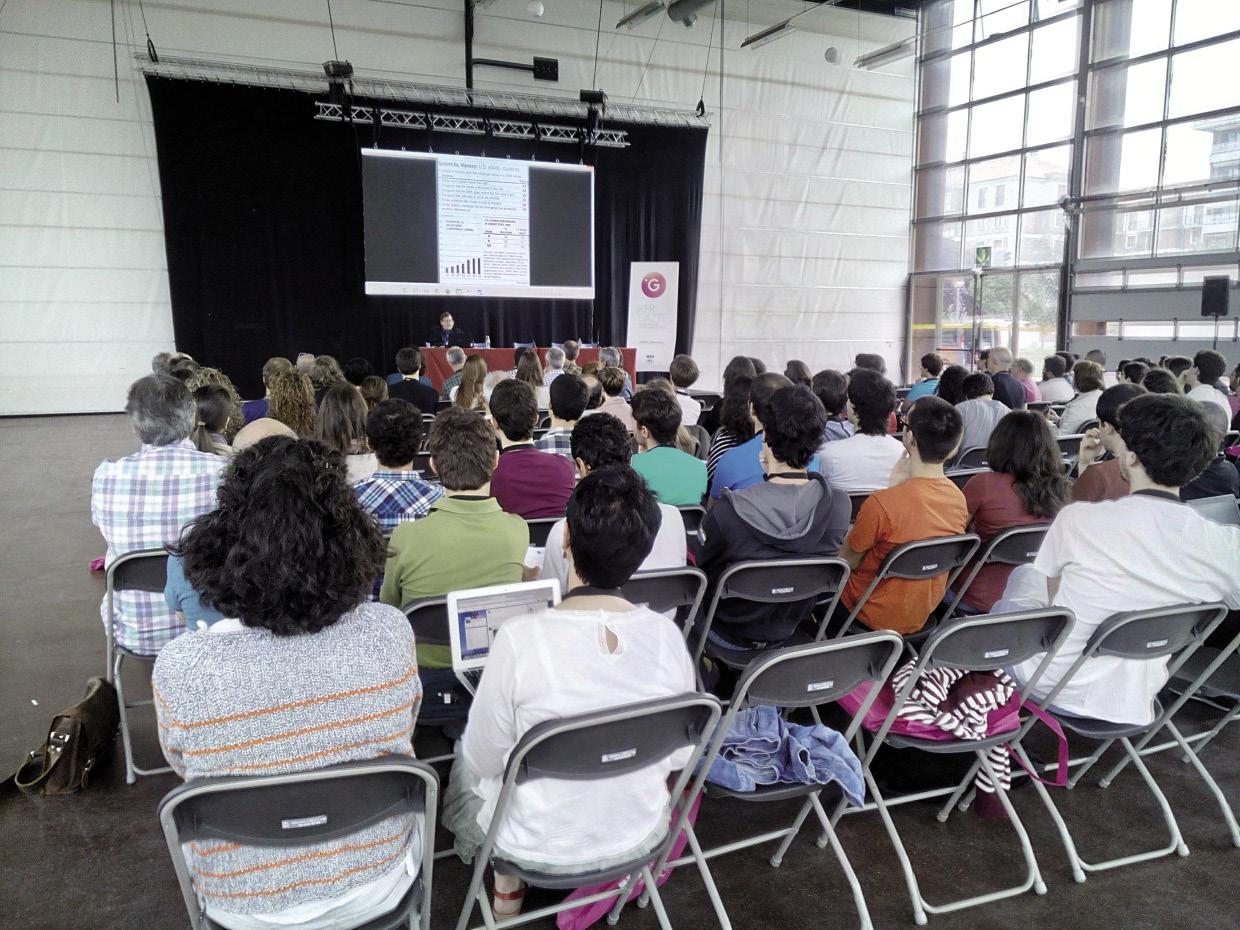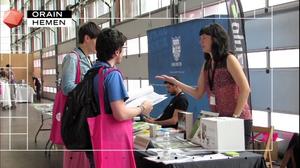Ikergazte, International Research in the Basque Country
2015/06/07 Latatu, Ainhoa - UEU | Alegria, Iñaki - UEU | Omaetxebarria Ibarra, Miren Josu - EHUko Biokimika eta Biologia Molekularra Saileko irakaslea eta ikertzailea Iturria: Elhuyar aldizkaria

Since its foundation 43 years ago, the consolidation of the Basque scientific and intellectual community is one of the most important objectives of the EU. Mutual knowledge is essential for knowledge to advance, even more so in our case, with the dispersion of researchers working in Basque.
In this regard, in recent decades the EU has brought together experts in different fields: The Meeting of Basque Computer Scientists (9 editions), the Meeting of Basque Historians (5 editions), the Meeting of Basque Linguists, the Meeting of Basque Mathematicians, the meetings of researchers from Health Sciences and Nature Sciences are clear examples of this.
We can say with satisfaction that Basque researchers are more than ever, but unfortunately their knowledge remains scarce. Aware of this lack, on 13, 14 and 15 May 2015 we organized the IKERGAZTE congress in Durango. It has been organized as an ordinary scientific congress, with general conferences, oral presentations and posters, workshops and complementary sessions, but with two specific characteristics: all areas of knowledge and in Basque.
The congress had three objectives. On the one hand, increase scientific production in Basque. On the other hand, increase the visibility of young Basque researchers. And finally, strengthen relationships between researchers.
The congress has been a success and we can say that all the objectives have been met.
Regarding production and visibility, 116 communications have been selected. They have been published in digital format (see buruxkak.eus) and have received more than 800 pages. 72 of them were oral presentations and 44 were posters.
The figures for areas of knowledge have been 15 of humanities, 21 of social sciences, 26 of exact sciences and natural sciences, 35 of engineering and architecture and 20 of health.
As for the universities from which they came, the University of the Basque Country/Euskal Herriko Unibertsitatea (UPV/EHU) has been the largest of them, with more than 70 contributions. Deusto (DU) and Mondragon (MU) have been mentioned in more than 10 articles. The Public University of Navarra, the research group Iker de Baiona (CNRS), Elhuyar I+D and EHU-CSIC are cited in four or five articles.
In addition, other research centers located in the Basque Country have participated: NU-Cima, NEIKER-Tecnalia, DIPC, cic-bioGUNE, CEIT, Biocruces and BCAM. In the case of entities outside the Basque Country, the universities referred to are: University of Granada, UAB (Barcelona). And research centers around the world: CNRS Pau, CSIC Madrid, Denmark, Germany, Finland, USA (New York, Denver), Australia.
To cite some articles and researchers, we would like to mention the winners as indicators of the existing diversity:
- Humanities: Begoña Altuna, “Study for the automatic treatment of temporary structures in Basque”.
- Social Sciences: Xabier Landabidea, “Euskaldunok eta telebista XXI. at the beginning of the century: a qualitative approach based on the words of the public.”
- Health: Nerea Osinalde, “In-depth Protein Study of Lit Signaling Pathways in Interleukin 2 (IL-2) and IL-15 T Lymphocytes”
- Science and Science of Nature: Ainara Valencia, “Endocrine disruption of reproduction in the mountains near the treatment plants of Gernika and Galindo (Chelon labrosus)”.
- In Engineering and Architecture: Gorka Azkune, “Learning dynamic and personalized models of knowledge-based human activities.”
- Udalbiltza special prize (the most important contribution to the development of the Basque Country): Olatz Perez de Viñaspre, “Is it possible to conduct bilingual health reports?”
The possibility of publishing and disseminating works that are published in English internationally has been chosen. We believe it has been a milestone in the research carried out in Basque!
On the other hand, to strengthen relationships between researchers, general talks, workshops and complementary sessions have been fundamental. Thus, the excellent presentations by Paul Zachary “PZ” Myers, Karmele Artetxe and Itziar Laka put an unbeatable point to debate and reflect.
Myers Minnesota Morris is a professor of biology at the university and well known for his blog Pharyngula. He advocated the researcher's work and encouraged young people to influence society more, helping them reject corrupt beliefs and convictions. She talked about creationism and intelligent design, widespread in the United States, and about the exclusion of women in science. He also stressed the freedom that scientists must have.
In addition to publicizing research in the field of neurolinguistics (on how they process the typologies of languages and brains of bilinguals), Itziar Laka spoke about the research activity itself, with two main ideas: that for researchers it is essential to live in the world of uncertainty and that research should focus on answering questions.
Karmele Artetxe studies the scientific community in Basque and explains how the relationship between science and Basque has historically been, taking advantage of the first publication in Basque on Einstein.
The workshops highlight a large participation, including the round table “The research trajectory”, directed by Xabier Paya. In addition to the contributions of Amaia Zurutuza, Joserra Diez, Iñaki Peña and Goizeder Barberena at the table, the opinions and experiences of young researchers completed the photo of this tour with its lights and shadows.
To carry out a congress of these characteristics we have had many sponsors, collaborators, collaborators and travel companions: universities, administration, research groups, commission researchers... Collaboration is fundamental in this field and we are happy in this sense. Here we want to emphasize the support of Basque universities: UPV/EHU, Public University of Navarra, University of Deusto and Mondragon Unibertsitatea.
We also want to highlight the collaboration of scientific journals in Basque: Inguru (UEU), magazine Bat Sociolinguistica, Ekaia (UPV/EHU), Elhuyar Zientzia eta Teknologia, Senez (EIZIE), Tantak (UPV/EHU) and Uztaro (UEU).
And we want to repeat it every two years. So pay attention to the upcoming calls!

Gai honi buruzko eduki gehiago
Elhuyarrek garatutako teknologia






